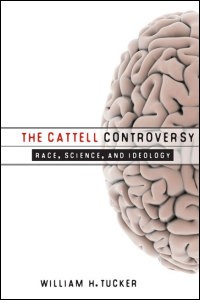
No, this isn’t science fiction. The new book The Cattell Controversy: Race, Science, and Ideology (University of Illinois Press) details what happened when the American Psychological Foundation selected Raymond Cattell to receive its 1997 Gold Medal for Life Achievement in Psychological Science.
Cattell’s nomination sparked a firestorm of protest that rocked the usually staid world of psychological scholarship. The new book by William Tucker, a professor of psychology at Rutgers University—Camden, delves into the heated controversy that continues even today.
Many recognize Cattell as the father of personality trait measurement for reducing thousands of characteristics into an essential 16; this factor analysis is still widely used in various disciplines.
But Cattell also created “Beyondism,” a proposed religion in which scientists play God by “phasing out” what he called "racio-cultural groups" with unfavorable personality traits, all in the name of evolutionary progress.
Cattell’s defenders continue to revere him and blame “political correctness” for the backlash against the nomination. It’s not that simple, says Tucker in his new book, which seeks to clarify Cattell’s very real desire to use his research, albeit scientifically sound, for deeply troubling political purposes.
"Cattell wanted to use his findings in the service of a blatantly immoral ideology not unlike beliefs underlying Nazi Germany," says the Rutgers–Camden professor.
"He didn’t want to see Jews killed, but he shared with the Reich the assumption that there are certain groups of people that were genetically defective and should be brought to extinction in some manner or another."
More specifically, this extinction would be through a non-violent process that Cattell called "genthanasia."

With writings so shocking, how could fellow psychologists be unaware of Cattell's evolutionary philosophy? Tucker suggests that colleagues who only read Cattell's findings in reputable science journals would never know the thousands of pages he published on "Beyondism."
In the wake of the controversy, Cattell withdrew his name from the prestigious recognition and died only months later at 93.
Even after years of studying Cattell's haunting plans for social cleansing, Tucker still recognizes his contributions to psychology, including the development of some 30 standardized instruments for assessing personality and intelligence used the world over.
"Can scientists with repugnant motivation nevertheless make a valuable contribution to their field? Clearly, yes. But we shouldn't honor them. "
Previous books of Tucker's include The Funding of Scientific Racism: Wickliffe Draper and the Pioneer Fund, in which he examines a New York foundation long suspected of covertly funding research that seeks to prove the genetic and intellectual inferiority of African Americans. The Science and Politics of Racial Research was published almost simultaneously with the ultra-conservative book The Bell Curve. Critics hailed Tucker’s work as “The Bell Curve’s antidote,” and he was honored with the esteemed Anisfield-Wolf Award, which had been previously presented to Toni Morrison, Malcolm X, Dr. Martin Luther King, Jr., and Langston Hughes.
- 30 -
Media Contact: Cathy K. Donovan
(856) 225-6627
E-mail: catkarm@camden.rutgers.edu